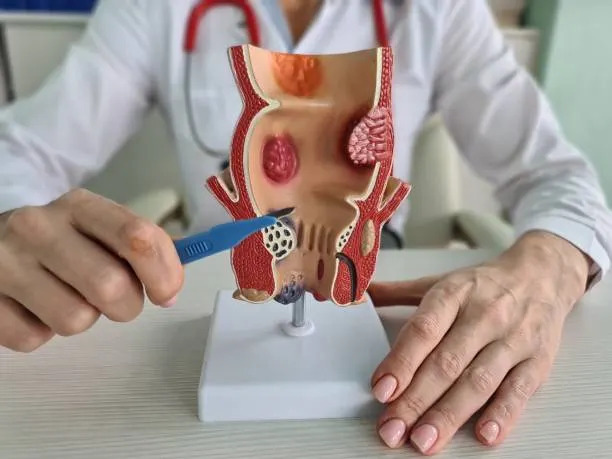Fistula Treatment (Anal Fistula)
An anal fistula is a small, infected tunnel that forms between the inside of the anus or rectum and the skin around the anus. It usually develops due to an anal abscess that does not heal properly and leaves a channel or tract behind. Fistulas cause pain, swelling, pus discharge, and irritation, and often require surgical treatment to heal completely.
Causes of Anal Fistula
- Anal abscess (most common cause)
- Crohn’s disease or other inflammatory bowel diseases (IBD)
- Tuberculosis (TB) in rare cases
- Radiation therapy to the pelvic area
- Trauma or injury to the anal region
- Post-surgical complications
- Sexually transmitted infections (STIs) (rare)
Common Symptoms
- Persistent pain around the anus
- Swelling or redness
- Pus or foul-smelling discharge
- Irritation or itching
- Recurring anal abscesses
- Fever (in case of active infection)
- Visible opening near the anus that drains pus or blood
Diagnosis
Diagnosis is based on:
- Physical examination
- Digital rectal exam
- Proctoscopy or anoscopy
- MRI or endoanal ultrasound (for complex or recurrent fistulas)
Types of Anal Fistula
- Intersphincteric Fistula – Most common type; tract lies between internal and external sphincter muscles.
- Transsphincteric Fistula – Tract passes through both sphincters.
- Suprasphincteric Fistula – More complex; tract goes above the sphincter muscles.
- Extrasphincteric Fistula – Rare; tract bypasses the sphincter muscles entirely.
- Horseshoe Fistula – U-shaped tract encircles the rectum; more difficult to treat.
Treatment Options for Anal Fistula
1. Surgical Treatment
Surgery is the primary treatment for most anal fistulas. Type of surgery depends on the fistula's complexity.
a. Fistulotomy
- The most common procedure
- Fistula tract is cut open and flattened, allowing it to heal from the inside out
- Ideal for simple, low fistulas
- High success rate (~90%)
b. Seton Placement
- A surgical thread (seton) is placed in the fistula tract
- Allows drainage and keeps the tract open to prevent abscess
- Used in complex or high-risk fistulas where cutting the muscle might risk incontinence
c. LIFT Procedure (Ligation of Intersphincteric Fistula Tract)
- Internal opening is closed, and fistula tract is removed
- Suitable for complex fistulas
- Minimizes risk of damage to sphincter muscles
d. Advancement Flap Surgery
- Internal opening of the fistula is covered with a flap of tissue
- Used in cases where sphincter preservation is critical
e. Laser Treatment (FiLaC)
- Minimally invasive technique using a laser to close the fistula tract
- Quick recovery and minimal tissue damage
f. Fibrin Glue or Fistula Plug
- Biologic materials used to seal the tract
- Low success rate; often used in selected or non-surgical cases
Non-Surgical Treatment
- Not commonly effective for most fistulas
- Antibiotics may be given in cases of active infection or before surgery
- Used only as supportive therapy






